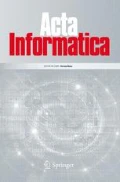Abstract
Partial derivatives are widely used to convert regular expressions to nondeterministic automata. For the word membership problem, it is not strictly necessary to build an automaton. In this paper, we study the size of partial derivatives on the average case. For expressions in strong star normal form, we show that on average and asymptotically the largest partial derivative is at most half the size of the expression. The results are obtained in the framework of analytic combinatorics considering generating functions of parametrised combinatorial classes defined implicitly by algebraic curves. Our average case estimates suggest that a detailed word membership algorithm based directly on partial derivatives should be analysed both theoretically and experimentally.


Similar content being viewed by others
Notes
This hypothesis states that for every positive \(\delta <1\), SAT cannot be solved in time \(O^*(2^{\delta n})\)—see [22].
Note that \(m(\partial ^+(s_n))\) is sequence A034856 minus 2 in OEIS (https://oeis.org/A034856).
This could be \(\Vert \gamma \Vert \). We note, however, that representing a set of PDs with the compact method of Sect. 8 results into subtree sharing, so the total size of the set is less than the sum of the sizes of its elements.
References
Adams, M.D., Hollenbeck, C., Might, M.: On the complexity and performance of parsing with derivatives. In: Krintz, C., Berger, E. (eds.) Proceedings of the 37th ACM SIGPLAN PLDI, pp. 224–236. ACM (2016). https://doi.org/10.1145/2908080.2908128
Antimirov, V.M.: Partial derivatives of regular expressions and finite automaton constructions. Theoret. Comput. Sci. 155(2), 291–319 (1996)
Backurs, A., Indyk, P.: Which regular expression patterns are hard to match? In: Dinur, I. (ed.) Proceedings of the 57th FOCS, pp. 457–466. IEEE Computer Society (2016). https://doi.org/10.1109/FOCS.2016.56
Bille, P., Thorup, M.: Faster regular expression matching. In: Albers, S., Marchetti-Spaccamela, A., Matias, Y., Nikoletseas, S.E., Thomas, W. (eds.) Proceedings of the 36th ICALP, Part I, LNCS, vol. 5555, pp. 171–182. Springer, Berlin (2009). https://doi.org/10.1007/978-3-642-02927-1_16
Bringmann, K., Grønlund, A., Larsen, K.G.: A dichotomy for regular expression membership testing. In: Umans, C. (ed.) Proceedings of the 58th FOCS, pp. 307–318. IEEE Computer Society (2017). https://doi.org/10.1109/FOCS.2017.36
Broda, S., Holzer, M., Maia, E., Moreira, N., Reis, R.: Mesh of automata. Inf. Comput. 265, 94–111 (2019). https://doi.org/10.1016/j.ic.2019.01.003
Broda, S., Machiavelo, A., Moreira, N., Reis, R.: On the average state complexity of partial derivative automata: an analytic combinatorics approach. Int. J. Found. Comput. Sci. 22(7), 1593–1606 (2011). https://doi.org/10.1142/S0129054111008908
Broda, S., Machiavelo, A., Moreira, N., Reis, R.: On the average size of Glushkov and partial derivative automata. Int. J. Found. Comput. Sci. 23(5), 969–984 (2012). https://doi.org/10.1142/S0129054112400400
Broda, S., Machiavelo, A., Moreira, N., Reis, R.: A Hitchhiker’s guide to descriptional complexity through analytic combinatorics. Theoret. Comput. Sci. 528, 85–100 (2014)
Broda, S., Machiavelo, A., Moreira, N., Reis, R.: On average behaviour of regular expressions in strong star normal form. Int. J. Found. Comput. Sci. 30(6–7), 899–920 (2019). https://doi.org/10.1142/S0129054119400227
Broda, S., Machiavelo, A., Moreira, N., Reis, R.: Analytic combinatorics and descriptional complexity of regular languages on average. ACM SIGACT News 51(1), 38–56 (2020). https://doi.org/10.1145/3388392.3388400
Brüggemann-Klein, A.: Regular expressions into finite automata. Theoret. Comput. Sci. 48, 197–213 (1993)
Champarnaud, J., Ziadi, D.: From c-continuations to new quadratic algorithms for automaton synthesis. Int. J. Alg. Comput. 11(6), 707–736 (2001). https://doi.org/10.1142/S0218196701000772
Champarnaud, J.M., Ouardi, F., Ziadi, D.: Normalized expressions and finite automata. Int. J. Algebra Comput. 17(1), 141–154 (2007). https://doi.org/10.1142/S021819670700355X
Champarnaud, J.M., Ziadi, D.: From Mirkin’s prebases to Antimirov’s word partial derivatives. Fundam. Inform. 45(3), 195–205 (2001)
Cochran, W.G.: Sampling Techniques, 3rd edn. Wiley, New York (1977)
Flajolet, P., Sedgewick, R.: Analytic Combinatorics. CUP, Cambridge (2008)
Gulan, S.: On the relative descriptional complexity of regular expressions and finite automata. Ph.D. thesis, Universität Trier (2011)
Hille, E.: Analytic Function Theory, vol. 2. Blaisdell Publishing Company (1962)
Khorsi, A., Ouardi, F., Ziadi, D.: Fast equation automaton computation. J. Discrete Algorithms 6(3), 433–448 (2008). https://doi.org/10.1016/j.jda.2007.10.003
Konstantinidis, S., Machiavelo, A., Moreira, N., Reis, R.: On the average state complexity of partial derivative transducers. In: Chatzigeorgiou, A., Dondi, R., Herodotou, H., Kapoutsis, C.A., Manolopoulos, Y., Papadopoulos, G.A., Sikora, F. (eds.) Proceedings of the SOFSEM 2020, LNCS, vol. 12011, pp. 174–186. Springer, Berlin (2020). https://doi.org/10.1007/978-3-030-38919-2_15
Lokshtanov, D., Marx, D., Saurabh, S.: Lower bounds based on the exponential time hypothesis. Bull. EATCS 105, 41–72 (2011)
Mirkin, B.G.: An algorithm for constructing a base in a language of regular expressions. Eng. Cybern. 5, 51–57 (1966)
Myers, E.W.: A four Russians algorithm for regular expression pattern matching. J. ACM 39(2), 430–448 (1992). https://doi.org/10.1145/128749.128755
Nicaud, C.: On the average size of Glushkov’s automata. In: Dediu, A., Ionescu, A.M., Vide, C.M. (eds.) Proceedings of the 3rd LATA, LNCS, vol. 5457, pp. 626–637. Springer, Berlin (2009)
Project FAdo: tools for formal languages manipulation. http://fado.dcc.fc.up.pt. Accessed date 1 Jan 2021
Thompson, K.: Regular expression search algorithm. CACM 11(6), 410–422 (1968)
Author information
Authors and Affiliations
Corresponding author
Additional information
Publisher's Note
Springer Nature remains neutral with regard to jurisdictional claims in published maps and institutional affiliations.
The authors António Machiavelo, Nelma Moreira and Rogério Reis were partially supported by CMUP, which is financed by national funds through FCT—Fundação para a Ciência e a Tecnologia, I.P., under the project with reference UIDB/00144/2020. Stavros Konstantinidis was partially supported by NSERC, Canada.
Rights and permissions
About this article
Cite this article
Konstantinidis, S., Machiavelo, A., Moreira, N. et al. On the size of partial derivatives and the word membership problem. Acta Informatica 58, 357–375 (2021). https://doi.org/10.1007/s00236-021-00399-6
Received:
Accepted:
Published:
Issue Date:
DOI: https://doi.org/10.1007/s00236-021-00399-6




